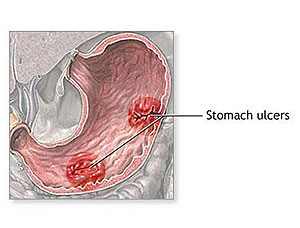Ulcers are sores on the lining of your digestive tract. Most ulcers are located in the duodenum. The duodenum is the first part of the intestines and starts just after your stomach. These ulcers are called duodenal ulcers. Ulcers located in the stomach are called gastric ulcers.


Ulcers are sores on the lining of your digestive tract. Most ulcers are located in the duodenum. The duodenum is the first part of the intestines and starts just after your stomach.
These ulcers are called duodenal ulcers. Ulcers located in the stomach are called gastric ulcers. Ulcers in the esophagus are called esophageal ulcers.
Two other disorders are much like ulcers. These are an inflamed lower esophagus (esophagitis) and an inflamed stomach lining (gastritis).
This health problem is normally linked with signs and symptoms such as stomach pain that may wake you up at night.
You may feel better when you eat or drink and then worse an hour or two after eating (duodenal ulcer) or you may feel worse when you eat or drink (gastric ulcer). There is heavy feeling, bloating, burning or dull pain anywhere in your stomach, times when you feel bad and then times when you feel good in between, there is vomiting and weight loss.
Causes
A type of bacteria called Helicobacter pylori (H. pylori) is thought to be a cause of many ulcers. Acid and other juices made by the stomach can lead to ulcers by burning the lining of your digestive tract. This can happen if your body makes too much acid or if the lining of your digestive tract is damaged in some way. Esophageal ulcers or esophagitis occur when stomach acid makes its way up into the lower esophagus.
Even though most people use anti-inflammatory drugs without problems, these drugs can sometimes damage the stomach lining and cause ulcers. Anti-inflammatory drugs include ASA (Aspirin), ibuprofen (some examples are Advil, Medipren, Motrin IB), and a number of prescription drugs for arthritis and related problems. Acetaminophen doesn’t damage the stomach lining.
Smoking also seems to delay or prevent ulcer healing. For some people, physical stress (such as being sick for a long time) may help cause ulcers. The role that emotional stress plays is not certain.
Treatment
One way to treat ulcers is to get rid of the H. pylori bacteria. Treatment may also be aimed at lowering the amount of acid that your stomach makes, to neutralize the acid that is made and to protect the injured area so it can have time to heal. It’s also very important to stop doing things, such as smoking or drinking, that damage the lining of your digestive tract.
Triple therapy/Antibiotics; A common treatment to eliminate H. pylori is to take two antibiotics and bismuth (an example is Pepto-Bismol or PPI), called triple therapy. Many combinations are effective.
H2 blockers; Medicine called H2 blockers reduce the amount of acid that your stomach makes. These medicines include cimetidine (an example is Tagamet), ranitidine (an example is Zantac), famotidine (an example is Pepcid) and nizatidine (an example is Axid). They usually help people start to feel better within three days. Usually the full dose can be given before the patient goes to bed.
Proton Pump Inhibitors (PPI’s). These medicines include omeprazole (an example is Losec), lansoprazole (and example is Prevacid) and they work to stops the stomach from making any acid.
Antacids. Antacids neutralize acid that the stomach makes. They may take a little longer than H2 blockers and PPI’s to work. Some antacids can cause constipation or diarrhea. They may help relieve symptoms but are not great for curing ulcers.
Sucralfate. A medicine called sucralfate (an example is Sulcrate) coats your ulcer to protect it from the acid so it has time to heal.
Treatment of H. pylori usually takes about two to three weeks. Usually one will not need to take medicine for longer than eight weeks. Most ulcers heal within this time. If the symptoms come back after you stop taking medicine, the doctor may suggest that you take a low dose of medicine even when one are not having symptoms to keep the ulcer from coming back But this is not true for everyone. Certain foods and drinks may be more likely to make your pain worse.
These include regular and decaffeinated coffee, tea, cocoa, chocolate, meat extracts, alcohol, black pepper, chili powder, mustard seed, and nutmeg. You may want to avoid these things to see if this helps you feel better.
Keep the diet balanced. Do not avoid foods unless they have bothered you more than once. If a person takes alcohol or caffeine drinks, it should be only when you are eating and in small amounts. Eating small, frequent meals when one is having pain may help you feel better.
Ends


